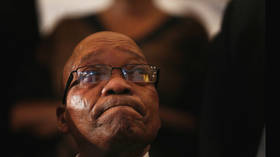Critics say former South African leader Jacob Zuma’s release is an “elaborate scheme” that helps him avoid accountability

South African President Jacob Zuma attends a service at Bryanston Methodist Church during a national day of prayer, on December 8, 2013 in Johannesburg, South Africa © Getty Images / Christopher Furlong/Getty Images
Jacob Zuma, the 81-year-old former president of South Africa, has avoided having to spend more time in prison, as part of a government-approved ‘special remission’ pardon scheme that has granted release to thousands of non-violent inmates and aimed to ease overcrowding concerns in its jails.
“This decision is aimed at alleviating the overcrowding in the prison services across the country,” South Africa’s justice minister Ronald Lamola said on Friday. He added that “the president’s decision is to remit offenders across the country and not specifically Zuma.”
Zuma was sentenced to 15 months in prison in 2021 after he was found to have refused to attend a court-ordered tribunal that investigated systematic corruption in state institutions, but was later released on medical grounds. However, it was ruled last month that his release –which came after he’d served two months– was unlawful and that he was to be returned to prison.
But after presenting himself at the Estcourt Correctional Center in KwaZulu-Natal Province on Friday, Zuma was released two hours later under the terms of the plan introduced by President Cyril Ramaphosa. Both Zuma and Ramaphosa are members of the African National Congress (ANC) political party.

Former president referred for criminal probe
According to the country’s correctional services, the measures implemented “approved the remission of non-violent offenders in South Africa.” The department added that the block pardons to nearly 10,000 prisoners, including Zuma, will help ease overcrowding in South African correctional facilities, while also protecting non-violent offenders from a “surge in gangsterism.”
Zuma’s initial detention in 2021 sparked a wave of protests and riots in two provinces which led to the deaths of more than 350 people. The South African government deployed military forces to four provinces soon after it was revealed last month that Zuma was to be returned to incarceration.
South Africa’s primary opposition party, the Democratic Alliance (DA), have questioned the legal methods which resulted in Zuma’s release, and said that the remission for close to 10,000 non-violent offenders was little more than an “elaborate scheme” with the sole purpose of letting “a single man” out of prison.
“The fact that remission comes into effect today – the same day on which Zuma returns to prison to be ‘processed’ is a clear indication of what has really occurred,” said the Democratic Alliance’s shadow justice minister Glynnis Breytenbach.
Separately, Zuma still faces 16 corruption charges related to 783 counts of alleged wrongdoing including corruption, racketeering, fraud and money-laundering related to a multi-billion-dollar arms deal while he was president.



